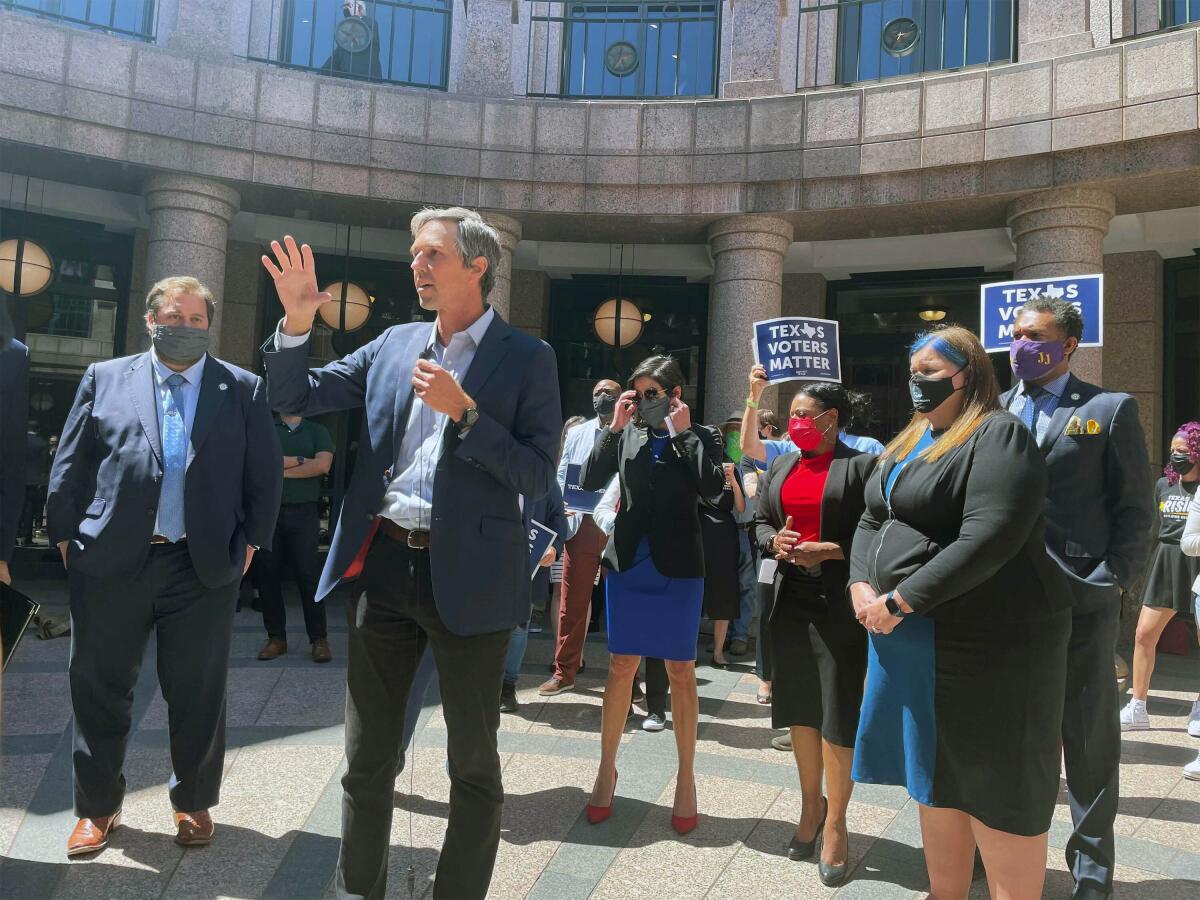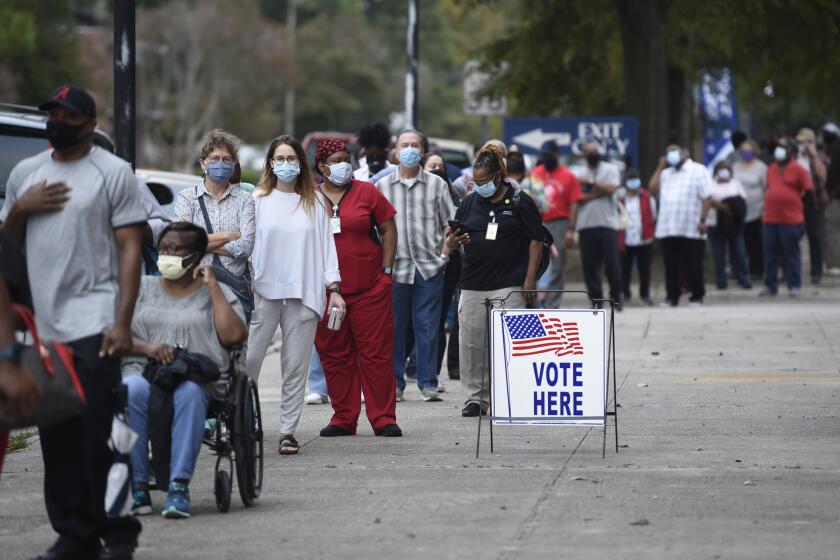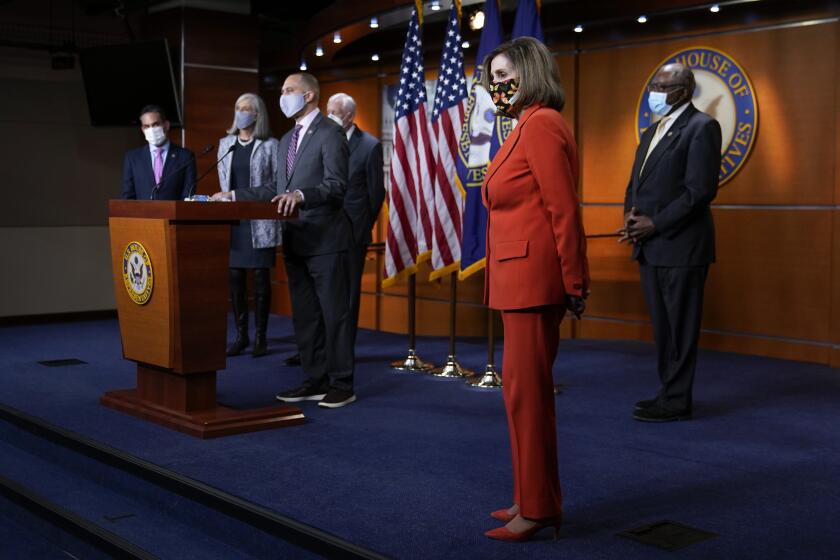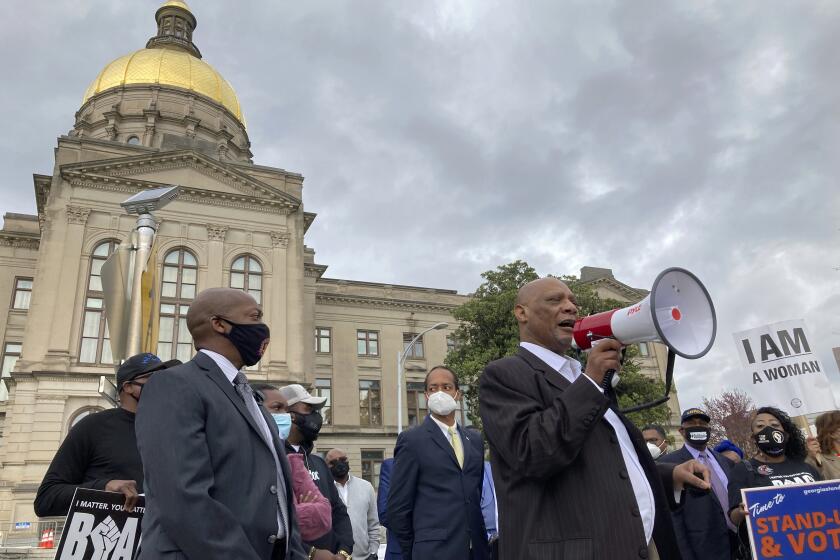Corporate criticism of Republican-led voting bills spreads to Texas

- Share via
AUSTIN, Texas — The ranks of large corporations now criticizing GOP efforts to restrict voting access spread Thursday to Texas as measures that would reduce options to cast ballots and limit polling hours advanced in the state Capitol.
American Airlines, which is based in Fort Worth, came out against restrictive voting measures that have a favorable path to reaching Republican Gov. Greg Abbott’s desk in the coming weeks.
The opposition came the same day a package of sweeping elections changes cleared the GOP-controlled Senate and, notably, a day after some of Georgia’s most prominent corporate leaders came out publicly against a new election law after civil rights activists criticized their silence.
“To make American’s stance clear: We are strongly opposed to this bill and others like it,” the airline said in a statement.
Unlike in Georgia, the corporate criticism in Texas of the election bills comes before they have been signed into law. Corporate interests carry big clout in the Texas Capitol, but Abbott and other Republicans have given no indication of wavering in their pursuit of passing the measures before the session ends in May.
The passage of Senate Bill 7 along party lines after midnight early Thursday was a key marker in the Republican Party’s campaign to impose new restrictive voting rules in the country’s biggest red state.
Hours later, House Republicans began efforts to move a similar bill, known as House Bill 6, to the floor with nearly 200 people signed up to testify.
Billionaire Michael Dell, whose tech company is headquartered in suburban Austin, tweeted Thursday: “Governments should ensure citizens have their voices heard. HB6 does the opposite, and we are opposed to it.”
Critics of the Texas legislation say the efforts particularly target expanded access put into place during last year’s election in Harris County, which is home to more than 2 million voters, controlled by Democrats and a key Texas battleground that includes Houston.
One measure would eliminate drive-through voting, which more than 127,000 people around Houston used during early voting last year. More than half of those voters were Black, Latino or Asian American, said Democratic state Sen. Carol Alvarado.
“Hearing all of that, who are you really targeting when you’re trying to get rid of drive-through voting?” she said.
Some of Georgia’s most prominent corporate leaders are beginning to more forcefully criticize the state’s sweeping new election law.
Republicans rejected accusations that the bill was designed to suppress turnout.
“None of what we’ve discussed is voter suppression. And none of what we’ve discussed is Jim Crow,” Republican state Sen. Paul Bettencourt said.
The voting packages in Texas mirror a nationwide campaign by Republicans following former President Trump’s false claims about election fraud.
The Republican and Democratic parties’ battle over voting rights and restrictions threatens to dominate and embitter the country’s politics.
Voting rights groups say the measures would disproportionately affect racial and ethnic minority voters. In Texas, which already has some of the strictest voting laws in the U.S., the proposed legislation grants more power to partisan poll watchers and eliminates the option to cast a ballot via drive-through. The bill also includes a provision requiring a doctor’s note for people with disabilities who want to vote by mail, although Republicans signaled during the debate that that language could change.
Trump won Texas but by fewer than 6 points. It was the closest victory by any GOP presidential nominee in Texas since 1996, underscoring Republicans’ loosening grip on the state.
The Senate bill cleared a committee last week following hours of testimony by voters. Some said the ongoing COVID-19 pandemic was forcing them to choose between their health and their right to be heard by their government after weighing the risk of testifying on the bill in person at the Texas Capitol, where mask-wearing is not enforced.
If Hollywood doesn’t want to boycott Georgia, it should unite with other big businesses there to denounce and battle the new Jim Crow laws.
Ofelia Alonso, 25, a volunteer with civil rights advocacy group Texas Rising and volunteer deputy registrar, said Friday that she drove hundreds of miles from Cameron County along the U.S.-Mexico border, which has been hit extremely hard by COVID-19, to testify in Austin for the members of her community who couldn’t afford the health risk.
“Honestly, because we all work doing voter registration, we know how nonsensical this bill is,” Alonso said. “It makes absolutely no sense to criminalize people for wanting to participate in democracy, which should be our goal. It is almost like Texans get punished for coming out and voting in large numbers.”
More to Read
Sign up for Essential California
The most important California stories and recommendations in your inbox every morning.
You may occasionally receive promotional content from the Los Angeles Times.












